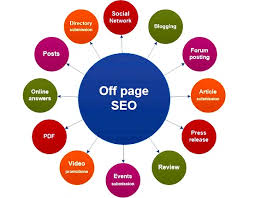In today's digital world, having a top-ranked website is key to success online. Using Off-Site SEO Practices is a smart way to boost your site's visibility and trustworthiness.
With the right off-site optimization strategies, you can see a big jump in your website's ranking. This means more visitors and potential customers for you. It's a big win for your online presence and your digital marketing goals.
By using these strategies, you can expand your content's reach and keep its SEO value.
Key Takeaways
- Understand the importance of off-page SEO in digital marketing.

- Learn effective strategies to improve your website's ranking.
- Discover how off-site optimization can boost your online presence.
- Implement techniques to drive more traffic to your website.
- Enhance your website's credibility with the right SEO practices.
The Crucial Role of Off-Page SEO in Your Digital Strategy
In the world of digital marketing, off-page SEO is key. It can greatly affect your website's visibility and trustworthiness. Off-page SEO means actions taken outside your site to improve your search rankings. It includes link building strategies and backlink building. These are vital for showing your site's authority and trust.What Makes Off-Page SEO Different from On-Page SEO
On-page SEO focuses on your site's content and structure. Off-page SEO, however, builds your site's reputation and presence online. This involves getting quality backlinks, using social media, and joining online communities. One big difference is control. You have full control over on-page SEO. But off-page SEO depends on other sites linking to you.Why Search Engines Value External Signals
Search engines look at external signals to judge your site's credibility and relevance. Backlink building is crucial here. It shows search engines your content is trustworthy and valuable. By using good link building strategies and a solid off-page SEO plan, you can boost your site's ranking. This will also bring more visitors to your site.Powerful Off-Site SEO Practices That Drive Results
Exploring off-page SEO reveals key strategies for boosting your website. It's about making your site more relevant, authoritative, and trustworthy. These efforts can greatly enhance your online visibility and search rankings.The Evolution of Off-Page Optimization
Off-page optimization has changed a lot over time. It used to involve tricks like keyword stuffing and link farming. Now, it focuses on building a real online presence through social media marketing, influencer outreach, and meaningful content. Here's how off-page optimization has evolved:- It started with manipulative tactics and exploiting loopholes.
- Link building became a main strategy.
- Social media's impact on rankings grew.
- Now, it's about a complete online presence, including social signals and influencer partnerships.
How to Measure Off-Page SEO Success
It's vital to track your off-page SEO success. Key indicators include:- Backlink quality and quantity.
- Social media engagement (likes, shares, comments).
- Influencer partnership outcomes (reach, engagement, conversions).
- Brand mentions online.
Everything You Need To Know About Business Key Insights And Strategies For Success
Creating a Balanced Off-Page Strategy
A well-rounded off-page SEO plan spreads efforts across various channels. This includes:- Social media marketing to boost your brand's online presence.
- Influencer outreach to reach specific audiences.
- Content marketing to attract quality backlinks.
- Participating in online communities related to your niche.
Best 50 Project Management Tools For B2B Of 2025
Strategic Backlink Building: The Cornerstone of Off-Site Authority
Backlink building is key to off-site SEO authority. It's not just about getting links. It's about getting them in a smart, lasting way that search engines like.Top 50 Customer Relationship Management Crm Software For B2B On 2025
Quality vs. Quantity: Finding the Right Balance
The debate on quality vs. quantity in backlink building is ongoing. Quality links come from trusted, relevant sources and boost your site. While more links are good, quality is more important for a strong backlink profile. To find the right balance, aim for links from top sites in your field. This boosts your site's trustworthiness and makes your link profile look natural.Top 25 Enterprise Resource Planning Erp Software For B2B
Natural vs. Artificial Link Profiles
A natural link profile is diverse and earned over time. It includes links from various places, like different domains and IP addresses. On the other hand, an artificial link profile comes from bad tactics and can harm your site. To keep a natural link profile, work hard and focus on making great, shareable content.The Ultimate Guide To B2B Lead Generation
Advanced Link Building Strategies
Good link building uses advanced tactics beyond simple methods. Two effective methods are the Broken Link Building Method and the Skyscraper Technique.Comprehensive Guide To Business To Business B2B Development
Broken Link Building Method
The Broken Link Building Method finds broken links and offers your content as a fix. It needs research and a personal touch in outreach.Comprehensive Guide To Business To Business B2B Development
Skyscraper Technique Implementation
The Skyscraper Technique makes content better than what's already ranking for your keyword. This means making your content more detailed, current, or engaging. Using these advanced strategies can greatly improve your backlink profile and your site's authority.The Importance Of Sustainability In B2B
Guest Blogging: Expanding Your Digital Footprint
Guest blogging lets you reach new people, build backlinks, and show you're a thought leader. By posting on other good websites, you grow your online presence. This helps you make friends in your field and boosts your SEO.Finding Relevant Guest Posting Opportunities
To make your guest blogging work, find sites that match your niche. Use search engines with terms like "guest posting opportunities in [your niche]" or "write for us [your niche]". Also, look at what your competitors post to find similar chances.Adapting To The Digital Transformation In B2B
Crafting Pitches That Get Accepted
A good pitch is key to getting your guest post accepted. Research the site and its readers. Make your pitch personal by showing how your content will help their readers. Keep it short, clear, and error-free. Share some of your past work to prove your worth.Adapting To The Digital Transformation In B2B
Maximizing SEO Value from Guest Posts
To get the best from your guest posts, optimize them for SEO. Use the right keywords, make catchy headlines, and add quality backlinks. Good optimization makes your post more visible and helps your SEO.Anchor Text Best Practices
When using anchor text, balance optimization with readability. Mix branded, generic, and keyword-rich texts for a natural link profile. Don't overdo it, as too much optimization looks spammy to search engines.15 Key Metrics For B2B Success
Author Bio Optimization
Your author bio is a chance to promote your brand and get more visitors. Make it compelling, describing who you are and what you do. Include a link to your site or a landing page. A well-optimized bio boosts your guest blogging by making you more visible online.The Impact Of Globalization On B2B Markets
Social Media Marketing for Enhanced Off-Page Performance
Social media marketing is now key to a good off-page SEO plan. It helps businesses grow their online presence and bring more visitors to their site.How To Building Strong B2B Relationships
Platform-Specific Strategies for SEO Impact
Each social media platform has its own SEO benefits. For example, Facebook and Instagram are great for photos and videos. Twitter is best for quick updates and news. Knowing what each platform is good at helps businesses make better content.- Use Facebook for detailed posts and building a community.
- Leverage Instagram for visual stories and working with influencers.
- Utilize Twitter for quick chats and hashtag campaigns.
Building Social Signals That Search Engines Notice
Social signals like likes and comments show how good your content is. To get more of these, make your content interesting and easy to share. This could be fun videos, helpful tips, or polls. Also, getting users to create content for you can really help. Hosting contests or campaigns that encourage people to share their stories or work can boost your social media presence. This can also bring more people to your website.Converting Social Engagement into Website Traffic
To turn social media fans into website visitors, you need a good plan. Use clear and compelling calls-to-action (CTAs) to guide people to your site. Also, make sure your social media profiles link back to your website and relevant pages. It's important to watch how your social media efforts are doing. Use analytics to see how many people are clicking and converting. This helps you make your strategy better and get more value from your efforts. In short, social media marketing is a big help for off-page SEO. By using the right strategies, building strong social signals, and turning fans into visitors, businesses can get more seen online and rank higher in search results.Influencer Outreach: Leveraging Industry Relationships
Influencer outreach is powerful because it helps you connect with your industry. By working with influencers who have a relevant audience, you boost your brand's credibility. This also helps you reach more people.Identifying the Right Influencers for Your Niche
Finding the right influencers is key to successful outreach. Look for those who share your brand values and have an audience that matches your target. Choose influencers who create quality content and are passionate about your niche.- Research their audience demographics to ensure alignment with your target market.
- Evaluate their content quality and relevance to your niche.
- Assess their engagement rates to gauge their influence.
Building Mutually Beneficial Partnerships
Good influencer outreach builds partnerships that benefit both sides. It's about creating content or collaborations that add value to your brand and the influencer's audience. Here are some strategies:- Guest blogging: Write guest posts for influencers' blogs to tap into their audience.
- Collaborative content: Produce content together, such as webinars, podcasts, or videos.
- Product or service collaborations: Offer your products or services to influencers for review or promotion.
Measuring the SEO Impact of Influencer Collaborations
To see how well your influencer outreach works, track its SEO impact. Look at your website's traffic, keyword rankings, and backlinks after collaborations.| Metric | Description | Impact |
|---|---|---|
| Website Traffic | Increase in visitors referred from influencer platforms | Positive |
| Keyword Rankings | Improvement in rankings for target keywords | Positive |
| Backlink Profile | Acquisition of high-quality backlinks from influencer sites | Positive |
Case Studies of Successful Influencer Campaigns
Many brands have seen big wins from influencer campaigns. For example, a fashion brand teamed up with a lifestyle influencer. This led to a 25% sales boost.Red Flags to Watch For
But, beware of potential pitfalls in influencer outreach. Watch out for fake followers or influencers who don't fit your brand. Always do your research to ensure a good partnership.Content Syndication: Expanding Your Content’s Reach
Content syndication can really help businesses grow online. By sharing your content on other sites, you reach new people. This boosts your website's traffic and makes you more visible online. To succeed in content syndication, knowing the right platforms and strategies is key. Here's how to make it work for you.Top Platforms for Effective Content Syndication
There are many platforms for syndicating your content. Some top ones include:- Medium: A widely-read platform that can help you reach a broad audience.
- LinkedIn Pulse: Ideal for B2B content, allowing you to target professionals and businesses.
- Industry-specific platforms: Niche platforms related to your industry can offer targeted exposure.
Avoiding Duplicate Content Issues
Content syndication can lead to duplicate content penalties. To avoid this:- Use canonical URLs pointing back to the original content on your site.
- Ensure syndicated content is clearly marked as republished.
- Negotiate with the syndicating platform to include a link back to your original content.
Maximizing Visibility While Preserving SEO Value
To get the most SEO benefits from syndication, focus on:- Quality over quantity: Choose high-quality, relevant platforms.
- Authoritative sources: Syndicate on sites with high credibility.
- Linking back: Make sure there's a link back to your original content to drive traffic and keep SEO value.
| Strategy | Description | SEO Benefit |
|---|---|---|
| Canonical URLs | Pointing back to original content | Prevents duplicate content issues |
| Quality Platforms | Syndicating on high-quality sites | Enhances credibility and visibility |
| Linking Back | Linking back to original content | Drives traffic and preserves SEO value |
Forum Participation and Online Community Engagement
Joining online forums and communities can boost your website's credibility and ranking. It helps you build relationships and show your expertise. This is a key part of a good off-page SEO plan.Identifying the Right Communities
Finding the right online communities is important. Look for ones that match your niche or area of expertise. Use Google search operators or directories to find them. Make sure they are active and reputable.- Research communities related to your niche.
- Evaluate the community's activity and engagement.
- Assess the quality of discussions and content shared.
Adding Value Without Being Promotional
When you join online communities, aim to add value, not spam. Share your knowledge, offer helpful insights, and join meaningful discussions. This builds trust and shows your authority, which can lead to backlinks and mentions. Focus on being helpful and informative.Optimizing Your Signature and Profile
Your signature and profile are key. Make sure your profile is complete, with a link to your website or a relevant page. Use your signature to promote your content or offers, but do it subtly and follow the community's rules. A well-optimized profile and signature can greatly improve your online presence.- Complete your profile with relevant information.
- Use your signature to link back to your site or content.
- Comply with community rules regarding self-promotion.
Conclusion: Implementing Your Off-Page SEO Strategy for Long-Term Success
A good off-page SEO strategy is key to boosting your website's ranking. Using techniques like backlink building and guest blogging can greatly improve your online presence. Link building is essential for your website's authority. Get high-quality backlinks from trusted sites, and steer clear of tactics that could damage your site's reputation. Combine this with social media and influencer outreach for a strong off-page SEO plan. Success in off-page SEO takes time and effort. Keep an eye on your progress, tweak your strategies as needed, and stay current with industry trends. This will help increase your website's visibility and attract more visitors. It's time to start using these strategies. Look for ways to grow and build a solid base for your off-page SEO. With hard work and commitment, you can see lasting improvements and elevate your website's success.FAQ
What is the primary goal of Off-Site SEO Practices?
Off-page SEO aims to boost a website's ranking and visibility. It uses external signals like backlinks, social media, and online community engagement.
How does guest blogging contribute to off-page SEO?
Guest blogging helps expand a website's digital footprint. It builds quality backlinks, boosting authority and credibility.
What is the difference between on-page and off-page SEO?
On-page SEO focuses on a website's internal elements, like content and meta tags. Off-page SEO deals with external factors, such as backlinks and social media, to enhance ranking and visibility.
How can social media marketing enhance off-page SEO performance?
Social media marketing boosts off-page SEO by creating social signals. It drives traffic and increases engagement, helping improve ranking and visibility.
What is the importance of quality over quantity in backlink building?
Quality backlinks from authoritative sources are more important than quantity. They significantly boost credibility and ranking, while low-quality links can harm.
How can influencer outreach benefit off-page SEO?
Influencer outreach helps by building quality backlinks and increasing engagement. It drives traffic through partnerships with influencers in specific niches.
What is content syndication, and how can it expand a content’s reach?
Content syndication republishes content on other sites or platforms. It expands reach, drives traffic, and boosts engagement while keeping SEO value.
How can forum participation and online community engagement contribute to off-page SEO?
Participating in forums and engaging in online communities builds presence. It drives traffic and boosts engagement through genuine interactions.
What is the role of directory submission in off-page SEO?
Directory submission increases online presence and drives traffic. It involves submitting a website to relevant directories and listings.
How can link building strategies be used to improve off-page SEO?
Link building strategies, like broken link building and the skyscraper technique, build quality backlinks. They increase presence and drive traffic, improving off-page SEO.

